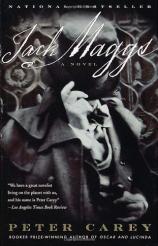Reading Group Guide
Discussion Questions
Jack Maggs

1. Maggs is a strong man with certain weaknesses. What in his background might have caused the tendency toward romantic fantasy (about Phipps, for example) which is so much at odds with his general clear-sightedness? What makes him violent; what makes him kind and tender?
2. Tobias Oates is possessed of an "unholy thirst for love" [p. 43]. How does this thirst shape and rule his life? Does he turn it to a strength or a weakness? Is it this thirst for love that inspires his equally strong thirst for power?
3. Percy Buckle has many admirable characteristics: early in the novel Mercy Larkin says that he is "the kindest, most decent man in all the world" [p. 79]. What turns him sour and fills him with hate? What weaknesses in his character allow this hatred to take over his soul?
4. There is much speculation by the characters in Jack Maggs about the "Criminal Mind." Oates thinks that Jack Maggs is an example of the criminal mind, but as the events unfold his ideas on the subject become less and less clear. Has Maggs been made a criminal by his nature, or by his environment? Is Oates, in your opinion, a criminal? What about Buckle, Phipps, Mary Britten, or Tom? Is there in fact any such thing as a criminal mind?
5. Who or what is the "Phantom" that haunts Jack Maggs's dreams? When Maggs dreams that he kills the Phantom [p. 124], what does this fantasy signify?
6. What effect has Sophina's abortion and the loss of their baby had upon Jack throughout his life? Might this loss have inspired Jack's original love for little Henry Phipps? Why do you think he persists in his love for Phipps at the expense of his own children back in Australia? Maggs says that he determined to "weave [Phipps] a nest so strong that no one would ever hurt his goodness" [p. 287]. Does Maggs's story imply that such protection is finally impossible?
7. How would you describe Mary Oates: is she really merely "good" and "dull" [p. 212] as her sister sees her? Just how astute is she about her husband? From the time of Lizzie's fatal illness, Mary begins to hate her husband, and this hatred eventually "would penetrate the deepest reaches of her soul and make her into the slow and famously dim-witted creature who was commonly thought not to understand half of what her famous husband said" [p. 342]. This sentence implies that earlier, she was neither slow nor dim-witted. What do you think?
8. Maggs is never a "gentleman"; Phipps is. What does this tell us about the class system in nineteenth-century England, and about the author's attitude toward it? What changes were occurring in the class system at that time, and how are these changes illustrated by the novel and its characters? Tobias and Buckle look on Maggs as a servant, themselves as masters: how does Carey subvert this idea? Mercy says that although he had two children of his own, Maggs "had an aim to find a better class of son" [p. 346]. Are Maggs's motives really as simple as this?
9. Two of the themes Jack Maggs returns to again and again are those of guilt and shame. For what crimes, real or imagined, do Oates and Maggs feel the most guilt and shame? What betrayals has each of them committed? Is their shame justified? Are there any characters in the novel who seem to be without guilt or sin?
10. Maggs tells Mercy that he was flogged by "a soldier of the King," to which she replies, "Then it were the King who lashed you" [p. 346]. What does Carey mean to imply about the social ills of England, and of the Australian penal colonies? How do Maggs's dreams, in which his Phantom is dressed as a soldier--and the reality in which the miniature he possesses of Phipps, the soldier, turns out to be the portrait of the former King George IV--contribute to the novel's political metaphor?
11. "It would not have been lost on [Oates] that Mercy Larkin's wedding finger was blown away, and that when Jack Maggs came to her side, the pair were finally matched in deformity" [p. 355]. What would not have been lost on Oates--what, that is, do the twin deformities symbolize?
12. Oates envisions the end of Maggs's story with Maggs being burned alive in his mansion. Which ending is more artistically appropriate: the one imagined by Oates, or the one Carey actually gives Maggs?
13. As a companion piece to Charles Dickens's Great Expectations, with Oates as Dickens and Maggs as Dickens's convict Magwitch, Jack Maggs can be seen as a reflection upon the creative process. Maggs sees Oates's usurpation of his life and thoughts as theft: "You are a thief," he says; You have cheated me, Toby, as bad as I was ever cheated" [p. 305-6]. Is Maggs justified in believing this? If so, is such theft an inevitable part of the creative and transformative process?
14. If you have read Dickens's Great Expectations, how do the characters of Maggs and Phipps differ from those of Magwitch and Pip, and why has Carey introduced these differences? How do the character and life of Dickens himself differ from that of Oates? What elements of the plot of Jack Maggs could be called "Dickensian"? What are the implications of a contemporary Australian novelist harking back to nineteenth-century English traditions?
Jack Maggs
- Publication Date: February 22, 1999
- Paperback: 368 pages
- Publisher: Vintage
- ISBN-10: 0679760377
- ISBN-13: 9780679760375








